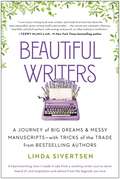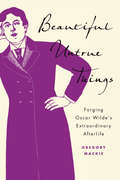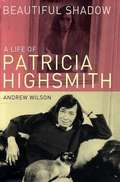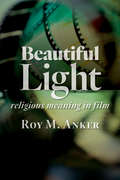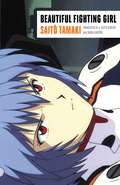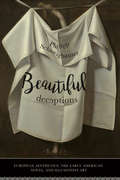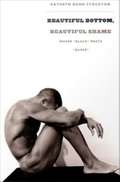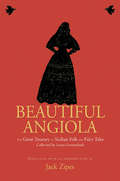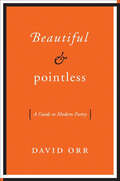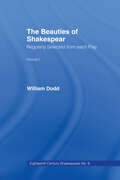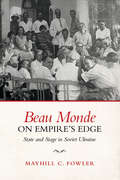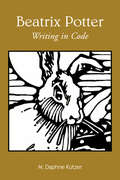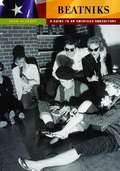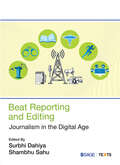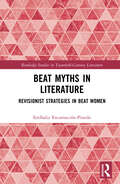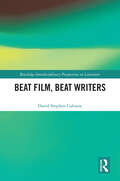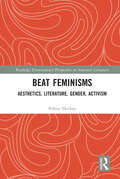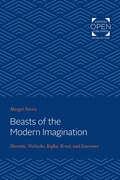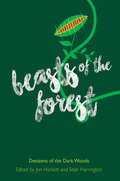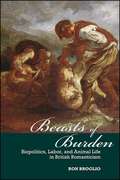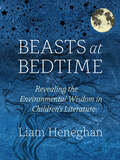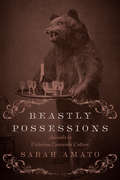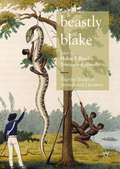- Table View
- List View
Beautiful Writers: A Journey of Big Dreams and Messy Manuscripts--with Tricks of the Trade from Bestselling Authors
by Linda Sivertsen"I own every writing book ever written, and Linda Sivertsen has done the near-impossible: given writing itself a personality . . . Her stories are cinematic, hilarious, heartfelt, and pitch-perfect—with energy and punch, so often lacking in nonfiction." —Terry McMillan, #1 New York Times bestselling author "A page-turning beach read doubling as how-to. Magic." —Jenny Lawson, #1 New York Times bestselling author, journalist, and blogger at The Bloggess "An engaging manual that offers writing advice with a big, broad, sunny worldview . . . fans of Sivertsen's podcast will devour this companion volume." —Kirkus Reviews International Impact Book Award Winner Imagine you're at a dinner party with some of the most successful authors of our time. "Book Mama" and Beautiful Writers Podcast co-creator Linda Sivertsen is the host. As she shares her story of the many hilarious, outrageous, and practical things she did to launch her bestselling writing career, your favorite writers chime in with their own anecdotes, leaving you enlightened and newly inspired. The wisdom in these pages will nourish anyone who appreciates the art of storytelling and dreams of living a creative life. Part coming-of-career memoir and writing success how-to, sprinkled with gems of celebrity author advice (taken from Linda&’s Beautiful Writers Podcast and follow-up interviews), Beautiful Writers is a love letter to reading, writing, and publishing—the book she wished she&’d had when starting out. In it, she shares—and expands on—the best of advice and storytelling from her podcast and follow-up interviews with literary greats, including: Terry McMillan Cheryl Strayed Tom Hanks Van Jones Jenny Lawson Steven Pressfield Elizabeth Gilbert Anne Lamott Mary Karr Seth Godin Abby Wambach Martha Beck Marie Forleo Lee Child Patricia Cornwell Dean Koontz Maria Shriver Dr. Jane Goodall Sabaa Tahir Tomi Adeyemi Ann Patchett Dani Shapiro Danielle LaPorte Tosca Lee Joy Harjo Deepak Chopra ?This heartwarming, how-I-made-it writing memoir from a working writer you've never heard of with inspiration and advice from the legends you love will help aspiring authors avoid common pitfalls and energize career writers with a treasure trove of writing insights from their peers—the details you don't often hear but make a world of difference. Destined to become the evergreen companion for creatives everywhere, Beautiful Writers answers the burning question: &“How do they do it—day after day, year after year, book after book?&” The paths vary wildly, but Linda&’s faith in dreams never does. &“If you have the ache, you have what it takes,&” she says. &“Writing is hard for everyone, but the results are often magical. Trust your desire. We did it—birthed our books into the world. You can too!"
Beautiful Untrue Things: Forging Oscar Wilde’s Extraordinary Afterlife
by Gregory MackieBorrowing its title from Oscar Wilde’s essay "The Decay of Lying," this study engages questions of fraudulent authorship in the literary afterlife of Oscar Wilde. The unique cultural moment of Wilde’s early-twentieth-century afterlife, Gregory Mackie argues, afforded a space for marginal and transgressive forms of literary production that, ironically enough, Wilde himself would have endorsed. Beautiful Untrue Things recovers the careers of several forgers who successfully inhabited the persona of the Victorian era’s most infamous homosexual and arguably its most successful dramatist. More broadly, this study tells a larger story about Oscar Wilde’s continued cultural impact at a moment when he had fallen out of favour with the literary establishment. It probes the activities of a series of eccentric and often outrageous figures who inhabited Oscar Wilde’s much-mythologized authorial persona – in forging him, they effectively wrote as Wilde – in order to argue that literary forgery can be reimagined as a form of performance. But to forge Wilde and generate "beautiful untrue things" in his name is not only an exercise in role-playing – it is also crucially a form of imaginative world-making, resembling what we describe today as fan fiction.
Beautiful Shadow: A Life of Patricia Highsmith
by Andrew WilsonThe first and highly anticipated biography of the author of such classics of suspense as Strangers on a Train and The Talented Mr. Ripley. The life of Patricia Highsmith was as secretive and unusual as that of many of the best-known characters who people her "peerlessly disturbing" writing. Yet even as her work - her thrillers, short stories, and the pseudonymous lesbian novel The Price of Salt- have found new popularity in the last few years, the life of this famously elusive writer has remained a mystery. For Beautiful Shadow, the first biography of Highsmith, journalist Andrew Wilson mined the vast archive of diaries, notebooks, and letters that Patricia Highsmith left behind, astonishing in their candor and detail. He interviewed her closest friends and colleagues as well as some of her many lovers. But Wilson also traces Highsmith's literary roots in the work of Poe, noir, and existentialism, locating the influences that helped distinguish Highsmith's writing so startlingly from more ordinary thrillers. The result is both a serious critical biography and one that reveals much about a brilliant and contradictory woman, one who despite her acclaim and affairs always maintained her solitude. Andrew Wilson is a journalist who has written for most of Britain's national newspapers, including the Daily Telegraph, the Guardian, the Independent on Sunday, and the Daily Mail. This is his first book. Whitbread Prize Nominee Patricia Highsmith, the celebrated author of Strangers on a Train and The Talented Mr. Ripley, was renowned as a suspense writer during her lifetime, and in recent years a revival of her chilling and highly original body of work has brought her even wider recognition. She was notoriously evasive about both the sources of her fiction and her private life. But with her death in February 1995, Highsmith left behind a vast archive of diaries, notebooks, and letters extraordinary in their candor and detail. Born in Fort Worth, Texas, into an unhappy marriage, Highsmith saw herself as an outsider even as a child. She was fascinated by Edgar Allan Poe and the case histories in Dr. Karl Menninger's The Human Mind, and by her teenage years she was exploring similar dark psychological themes in her own writing. As a college student in New York City and throughout her life, she conducted a series of passionate affairs with women who often also served as mentors or muses--many of whom speak here about Highsmith for the first time. Yet these romances were always more alluring in the ideal than in reality, and Highsmith found her greatest lasting happiness in her work. Using Highsmith's intimate papers, together with material gleaned from her closest friends and lovers, Andrew Wilson has written the first biography of this veiled figure, an author described by Graham Greene as "the poet of apprehension" and by Gore Vidal as "one of our greatest modernist writers." From Texas, Wilson follows Highsmith's trail to New York, Italy, England, France, Germany, and her final resting place in Tegna, Switzerland. With this remarkable book, he illuminates Highsmith's creative process and reveals the secrets that the writer chose to keep hidden until after her death, finally allowing the full portrait of this compelling, contradictory woman to emerge.
Beautiful Light: Religious Meaning in Film
by Roy M. AnkerThough "religious" films usually don't get much respect in Hollywood, religion still regularly finds its way into the movies. In Beautiful Light Roy Anker seeks out the often unnoticed connections between film and religion and shows how even films that aren't overtly religious or Christian in their content can be filled with deep religious insights and spiritual meaning. Closely examining nine critically acclaimed films, including Magnolia, The Apostle, American Gigolo, and M. Night Shyamalan's Wide Awake, Anker analyzes the ways in which these movies explore what it means to be human—and what it means, as human beings, to wrestle with a sometimes unwieldy divine presence. Addressing questions of doubt and belief, despair and elation, hatred and love, Anker's work sheds "beautiful light" on some of Hollywood's most profound and memorable films.
Beautiful Light: Religious Meaning in Film
by Roy M. AnkerThough "religious" films usually don't get much respect in Hollywood, religion still regularly finds its way into the movies. In Beautiful Light Roy Anker seeks out the often unnoticed connections between film and religion and shows how even films that aren't overtly religious or Christian in their content can be filled with deep religious insights and spiritual meaning. Closely examining nine critically acclaimed films, including Magnolia, The Apostle, American Gigolo, and M. Night Shyamalan's Wide Awake, Anker analyzes the ways in which these movies explore what it means to be human—and what it means, as human beings, to wrestle with a sometimes unwieldy divine presence. Addressing questions of doubt and belief, despair and elation, hatred and love, Anker's work sheds "beautiful light" on some of Hollywood's most profound and memorable films.
Beautiful Fighting Girl
by Saito TamakiFrom Cutie Honey and Sailor Moon to Nausicaä of the Valley of the Wind, the worlds of Japanese anime and manga teem with prepubescent girls toting deadly weapons. Sometimes overtly sexual, always intensely cute, the beautiful fighting girl has been both hailed as a feminist icon and condemned as a symptom of the objectification of young women in Japanese society. In Beautiful Fighting Girl, Saitō Tamaki offers a far more sophisticated and convincing interpretation of this alluring and capable figure. For Saitō, the beautiful fighting girl is a complex sexual fantasy that paradoxically lends reality to the fictional spaces she inhabits. As an object of desire for male otaku (obsessive fans of anime and manga), she saturates these worlds with meaning even as her fictional status demands her ceaseless proliferation and reproduction. Rejecting simplistic moralizing, Saitō understands the otaku&’s ability to eroticize and even fall in love with the beautiful fighting girl not as a sign of immaturity or maladaptation but as a result of a heightened sensitivity to the multiple layers of mediation and fictional context that constitute life in our hypermediated world—a logical outcome of the media they consume. Featuring extensive interviews with Japanese and American otaku, a comprehensive genealogy of the beautiful fighting girl, and an analysis of the American outsider artist Henry Darger, whose baroque imagination Saitō sees as an important antecedent of otaku culture, Beautiful Fighting Girl was hugely influential when first published in Japan, and it remains a key text in the study of manga, anime, and otaku culture. Now available in English for the first time, this book will spark new debates about the role played by desire in the production and consumption of popular culture.
Beautiful Deceptions: European Aesthetics, the Early American Novel, and Illusionist Art
by Philipp SchweighauserThe art of the early republic abounds in representations of deception: the villains of Gothic novels deceive their victims with visual and acoustic tricks; the ordinary citizens of picaresque novels are hoodwinked by quacks and illiterate but shrewd adventurers; and innocent sentimental heroines fall for their seducers' eloquently voiced half-truths and lies. Yet, as Philipp Schweighauser points out in Beautiful Deceptions, deception happens not only within these novels but also through them. The fictions of Charles Brockden Brown, Hugh Henry Brackenridge, Susanna Rowson, Hannah Webster Foster, Tabitha Gilman Tenney, and Royall Tyler invent worlds that do not exist. Similarly, Charles Willson Peale's and Raphaelle Peale's trompe l'oeil paintings trick spectators into mistaking them for the real thing, and Patience Wright's wax sculptures deceive (and disturb) viewers. Beautiful Deceptions examines how these and other artists of the era at times acknowledge art's dues to other social realms--religion, morality, politics--but at other times insist on artists' right to deceive their audiences, thus gesturing toward a more modern, autonomous notion of art that was only beginning to emerge in the eighteenth century. Building on Alexander Gottlieb Baumgarten's definition of aesthetics as "the science of sensuous cognition" and the writings of early European aestheticians including Kant, Schiller, Hume, and Burke, Schweighauser supplements the dominant political readings of deception in early American studies with an aesthetic perspective. Schweighauser argues that deception in and through early American art constitutes a comment on eighteenth-century debates concerning the nature and function of art as much as it responds to shifts in social and political organization.
Beautiful Bottom, Beautiful Shame: Where "Black" Meets "Queer"
by Kathryn Bond StocktonShame, Kathryn Bond Stockton argues in Beautiful Bottom, Beautiful Shame, has often been a meeting place for the signs "black" and "queer" and for black and queer people--overlapping groups who have been publicly marked as degraded and debased. But when and why have certain forms of shame been embraced by blacks and queers? How does debasement foster attractions? How is it used for aesthetic delight? What does it offer for projects of sorrow and ways of creative historical knowing? How and why is it central to camp? Stockton engages the domains of African American studies, queer theory, psychoanalysis, film theory, photography, semiotics, and gender studies. She brings together thinkers rarely, if ever, read together in a single study--James Baldwin, Radclyffe Hall, Jean Genet, Toni Morrison, Robert Mapplethorpe, Eldridge Cleaver, Todd Haynes, Norman Mailer, Leslie Feinberg, David Fincher, and Quentin Tarantino--and reads them with and against major theorists, including Georges Bataille, Sigmund Freud, Eve Kosofsky Sedgwick, Jacques Lacan, Roland Barthes, and Leo Bersani. Stockton asserts that there is no clear, mirrored relation between the terms "black" and "queer"; rather, seemingly definitive associations attached to each are often taken up or crossed through by the other. Stockton explores dramatic switchpoints between these terms: the stigmatized "skin" of some queers' clothes, the description of blacks as an "economic bottom," the visual force of interracial homosexual rape, the complicated logic of so-called same-sex miscegenation, and the ways in which a famous depiction of slavery (namely, Morrison's Beloved) seems bound up with depictions of AIDS. All of the thinkers Stockton considers scrutinize the social nature of shame as they examine the structures that make debasements possible, bearable, pleasurable, and creative, even in their darkness.
Beautiful Angiola: The Lost Sicilian Folk and Fairy Tales of Laura Gonzenbach
by Jack ZipesIn one of the most startling literary discoveries of recent years, Jack Zipes has uncovered this neglected treasure trove of Sicilian folk and fairy tales. Like the Grimm brothers before her, Laura Gonzenbach, a talented Swiss-German born in Sicily, set out to gather up the tales told and retold among the peasants. Gonzenbach collected wonderful stories - some on subjects that readers will know from the Grimms or Perrault, some entirely new - and published them in German. Her early death and the destruction of her papers in the Messina earthquake of 1908 only add to the mystery behind her achievement. Beautiful Angiola is an instant classic: a nineteenth-century collection of stories in the great tradition of fairy and folk tales now translated into English for the first time. Gonzenbach delights us with heroines and princes, sorcery and surprise, the deeds of the brave and the treacherous, and the magic of the true storyteller. The Green Bird , The Humiliated Princess , sorfarina , The Magic Cane, the Golden Donkey, and the Little Stick that Hits are titles destine to become new favourites for readers everywhere. Yet while the stories enchant us, the wry taglines with which they often end ('And so they remained rich and consoled, while we keep sitting here and are getting old') gently bring us back to earth.
Beautiful & Pointless: A Guide to Modern Poetry
by David Orr"David Orr is no starry-eyed cheerleader for contemporary poetry; Orr’s a critic, and a good one. . . . Beautiful & Pointless is a clear-eyed, opinionated, and idiosyncratic guide to a vibrant but endangered art form, essential reading for anyone who loves poetry, and also for those of us who mostly just admire it from afar." —Tom Perrotta Award-winning New York Times Book Review poetry columnist David Orr delivers an engaging, amusing, and stimulating tour through the world of poetry. With echoes of Francine Prose’s Reading Like a Writer, Orr’s Beautiful & Pointless offers a smart and funny approach to appreciating an art form that many find difficult to embrace.
Beauties of Shakespeare Cb: Eighteenth Century Shakespeare Volume 9 - 2 Volumes
by William DoddFirst published in 2005. Routledge is an imprint of Taylor & Francis, an informa company.
Beau Monde on Empire’s Edge: State and Stage in Soviet Ukraine
by Mayhill FowlerIn Beau Monde on Empire’s Edge, Mayhill C. Fowler tells the story of the rise and fall of a group of men who created culture both Soviet and Ukrainian. This collective biography showcases new aspects of the politics of cultural production in the Soviet Union by focusing on theater and on the multi-ethnic borderlands. Unlike their contemporaries in Moscow or Leningrad, these artists from the regions have been all but forgotten despite the quality of their art. Beau Monde restores the periphery to the center of Soviet culture. Sources in Russian, Ukrainian, Polish, and Yiddish highlight the important multi-ethnic context and the challenges inherent in constructing Ukrainian culture in a place of Ukrainians, Russians, Poles, and Jews. Beau Monde on Empire’s Edge traces the growing overlap between the arts and the state in the early Soviet years, and explains the intertwining of politics and culture in the region today.
Beatrix Potter: Writing in Code (Children's Literature and Culture #27)
by M. Daphne KutzerBeatrix Potter was one of the inventors of the contemporary picture book, and her small novels published at the turn of the twentieth century are still available and popular today. Writing in Code is the first book-length study of Potter's work, and it covers the entire oeuvre, examining all facets of her work in relation to her private life. Daphne Kutzer reveals the depth of the symbolism in Potter’s work and relates this to the issues of the author's own development as an independent woman and writer, and her struggles with domesticity, Unitarianism, and the socio-political issues in late-19th and early-20th century England. Weaving the subtle themes inscribed in Potter's own stories with the concerns and temperament of the author who wrote them, Kutzer exemplifies literary criticism as it can illuminate the breadth of allusion in children's literature.
Beatniks: A Guide To An American Subculture
by Alan BisbortA historian of American culture and art, Bisbort profiles the first counter-culture generation to be branded by modern marketing. He describes the origins of the beat generation during World War II, how the beats turned into beatniks, the emergence of a beatnik voice, and the spread of the phenomenon from Manhattan to the US and the world. Support material includes a timeline, biographical sketches, a glossary, lists of movies and magazines, and lists of precursors and progeny. Annotation c2010 Book News, Inc., Portland, OR (booknews.com)
Beat Reporting and Editing: Journalism in the Digital Age
by Surbhi Dahiya Shambhu SahuFirst of its kind book to have extensive coverage of reporting, with a special focus on beat reporting. Beat Reporting and Editing: Journalism in the Digital Age offers an extensive and pioneering study of reporting for all the news beats, and news writing and editing. Besides having exclusive chapters on rural reporting, storytelling, photojournalism and cartooning, social media reporting, misinformation and fake news, and solution-based journalism, this coedited forty-eight-chapter textbook is an exhaustive resource filled with insights on traditional beats like defence, politics, court, crime, sports and entertainment. It covers all the emerging forms of journalism such as artificial intelligence (AI), blockchain and bots, podcast, mobile journalism (MOJO), drone journalism (DOJO) and data journalism in India. The book is structured to guide the students and teachers on the techniques of reporting on specific beats in the digital environment, role of AI and digital technologies in newsgathering and reportage as well as issues of identity, data, research and analysis in new-age journalism. Drawing on an enormous range of examples, case studies and first-hand experiences of eminent journalists and media educators, it encourages students to critically engage with all forms of journalistic writing in the digital era. Key Features: • First-of-its-kind textbook to include extensive coverage of reporting, with special focus on beat reporting • Not only limited to print media but also covers broadcast journalism as well as digital media • Contains chapters by highly experienced journalists who have worked in their specific beats for decades, and academicians teaching the subject in the classroom • One of the most future-ready textbooks on journalism featuring a whole section on innovations and emerging technologies in journalism
Beat Myths in Literature: Revisionist Strategies in Beat Women (Routledge Studies in Twentieth-Century Literature)
by Estíbaliz Encarnación-PinedoBeat Myths in Literature reassesses the work of women poets associated with the Beat Generation from the critical lens of revisionist discourses. Using the metaphor and the critical lens of looking back, an act infused with feminist implications after Adrianne Rich (1972), the volume focuses on poetry, fiction, and autobiographical writing to analyze the different ways in which Beat women used revisionist discourses to refashion the Beat Generation and establish themselves as literary and artistic subjects. Offering the first comprehensive study of the use of mythology in the Beat Generation, Beath Myths in Literaute: Revisionist Strategies in Beat Women focuses on the specific re-writing or revisioning of mythical texts. As such, it studies the ways in which Beat poets incorporate mythology into their works, both through the feminist reinvention or appropriation of ancient myths, but also by debunking more contemporary myths used to contain women in particular social and artistic roles. Furthermore, this volume expands Rich’s notion of re-vision, considering memoirs and autobiographies as factual and fictional re-interpretations of history. Seen through the eyes of revisionist studies and the poets’ investment in “personal myth”, the book establishes new points of entrance into works that allow us to explore the feminist, political, and poetical relevance of the work of Beat women.
Beat Film, Beat Writers (Routledge Interdisciplinary Perspectives on Literature)
by David Stephen CalonneBeat Film, Beat Writers is the first monograph to analyze the films of Christopher Maclaine, Lawrence Jordan, ruth weiss, Ron Rice, Robert Frank, Barbara Rubin, Shirley Clarke, William S. Burroughs, and Joanne Kyger. The book is noteworthy for its emphasis on women filmmakers who have traditionally been excluded from close analysis by film scholars. Beat Film, Beat Writers also explores the ways Beat authors such as Philip Lamantia, Michael McClure, Diane di Prima, Wiliam S. Burroughs, Allen Ginsberg, Jack Kerouac, Peter Orlovsky, Gregory Corso, Joanne Kyger, and others became deeply involved with the film communities of New York and California. The book discusses their roles as both actors and participants in the making of these films and demonstrates how many of the same themes that characterized Beat literature surface in cinema. The anxiety over the possibilities of nuclear war, the search for deeper modes of spirituality in the study of Buddhism as well as occult and esoteric systems, the struggle for equality for the LGBTQ+ community, the beginnings of the ecological movement, and the fight against censorship and the open depiction of sexuality are all themes that occur both in Beat film and in Beat literature. Beat Film, Beat Writers also features an Epilogue on the cinema of singer and poet Jim Morrison, who, although not part of the Beat movement, was deeply influenced by Beat literature and carried on many of the aesthetic and philosophical aims of the Beats into the late sixties.
Beat Feminisms: Aesthetics, Literature, Gender, Activism (Routledge Transnational Perspectives on American Literature)
by Polina MackayThis is the first book-length study to read women of the Beat Generation as feminist writers. The book focuses on one author from each of the three generations that comprise the groups of female writers associated with the Beats – Diane di Prima, ruth weiss and Anne Waldman – as well as on experimental and multimedia artists, such as Laurie Anderson and Kathy Acker, who have not been read through the prism of Beat feminism before. Beat Feminisms argues that these writers’ feminism evolved over time, but retained a focus on intertextuality, on visions of transformation, on revisions of patriarchal discourses, on gender and on interventionist poetics within the context of activism. The book shows how these Beat feminisms counteract the ways in which women have been undermined, possessed or silenced.
Beasts of the Modern Imagination: Darwin, Nietzsche, Kafka, Ernst, and Lawrence
by Margot NorrisOriginally published in 1985. Beasts of the Modern Imagination explores a specific tradition in modern thought and art: the critique of anthropocentrism at the hands of "beasts"—writers whose works constitute animal gestures or acts of fatality. It is not a study of animal imagery, although the works that Margot Norris explores present us with apes, horses, bulls, and mice who appear in the foreground of fiction, not as the tropes of allegory or fable, but as narrators and protagonists appropriating their animality amid an anthropocentric universe. These beasts are finally the masks of the human animals who create them, and the textual strategies that bring them into being constitute another version of their struggle. The focus of this study is a small group of thinkers, writers, and artists who create as the animal—not like the animal, in imitation of the animal—but with their animality speaking. The author treats Charles Darwin as the founder of this tradition, as the naturalist whose shattering conclusions inevitably turned back on him and subordinated him, the rational man, to the very Nature he studied. Friedrich Nietzsche heeded the advice implicit in his criticism of David Strauss and used Darwinian ideas as critical tools to interrogate the status of man as a natural being. He also responded to the implications of his own animality for his writing by transforming his work into bestial acts and gestures. The third, and last, generation of these creative animals includes Franz Kafka, the Surrealist artist Max Ernst, and D. H. Lawrence. In exploring these modern philosophers of the animal and its instinctual life, the author inevitably rebiologizes them even against efforts to debiologize thinkers whose works can be studied profitably for their models of signification.
Beasts of the Forest: Denizens of the Dark Woods
by Jon Hackett and Seán HarringtonAn interdisciplinary engagement with the forest and its monsters through critical readings of folklore, fiction, film, music video and animation.Within the text there are a multitude of convergent critical perspectives used to engage and explore fictional and real monsters of the forest in media and folklore. The collection features chapters from a variety of academic perspectives: film and media studies, cultural studies, queer theory, Tolkien studies, mythology and popular music are featured. Under examination are a wide range of narratives and media forms that represent, reimagine and create the werewolves, witches and weird apparitions that inhabit the forest, along with the forest as a monstrous entity in itself.Whether they be our shelter and safe-haven or the domain of malevolent spirits and sprites, forests have the capacity to horrify and threaten those that venture into them without permission. Human interference has continually threatened forests across the world, yet this threat is reversed in myth, folklore and more recent cultural forms. This collection ranges widely to analyze how forests figure in contemporary culture, as well as the wider contexts in which such representations are inserted.
Beasts of Burden: Biopolitics, Labor, and Animal Life in British Romanticism (SUNY series, Studies in the Long Nineteenth Century)
by Ron BroglioIn Beasts of Burden, Ron Broglio examines how lives—human and animal—were counted in rural England and Scotland during the Romantic period. During this time, Britain experienced unprecedented data collection from censuses, ordinance surveys, and measurements of resources, all used to quantify the life and productivity of the nation. It was the dawn of biopolitics—the age in which biological life and its abilities became regulated by the state. Borne primarily by workers and livestock, nowhere was this regulation felt more powerfully than in the fields, commons, and enclosures. Using literature, art, and cultural texts of the period, Broglio explores the apparatus of biopolitics during the age of Adam Smith and Thomas Malthus. He looks at how data collection turned everyday life into citizenship and nationalism and how labor class poets and artists recorded and resisted the burden of this new biopolitical life. The author reveals how the frictions of material life work over and against designs by the state to form a unified biopolitical Britain. At its most radical, this book changes what constitutes the central concerns of the Romantic period and which texts are valuable for understanding the formation of a nation, its agriculture, and its rural landscapes.
Beasts at Bedtime: Revealing the Environmental Wisdom in Children's Literature
by Liam Heneghan“[A] fresh new look at animal tales, often classic, and how they pertain to the present-day and our often fraught relationship to our environment.” —Jeff VanderMeer, author of the Southern Reach TrilogyTalking lions, philosophical bears, very hungry caterpillars, wise spiders, altruistic trees, companionable moles, urbane elephants: this is the magnificent menagerie that delights our children at bedtime. Within the entertaining pages of many children’s books, however, also lie profound teachings about the natural world that can help children develop an educated and engaged appreciation of the dynamic environment they inhabit.In Beasts at Bedtime, scientist (and father) Liam Heneghan examines the environmental underpinnings of children’s stories. From Beatrix Potter to Harry Potter, Heneghan unearths the universal insights into our inextricable relationship with nature that underlie so many classic children’s stories. Some of the largest environmental challenges in coming years—from climate instability, the extinction crisis, freshwater depletion, and deforestation—are likely to become even more severe as this generation of children grows up. Though today’s young readers will bear the brunt of these environmental calamities, they will also be able to contribute to environmental solutions if prepared properly. And all it takes is an attentive eye: Heneghan shows how the nature curriculum is already embedded in bedtime stories, from the earliest board books like The Rainbow Fish to contemporary young adult classics like The Hunger Games.This book enthralls as it engages. Beasts at Bedtime will help parents, teachers, and guardians extend those cozy times curled up together with a good book into a lifetime of caring for our planet.“Beasts at Bedtime is proof that most kidlit has teachable moments embedded in it.” —Toronto Star
Beastly Possessions
by Sarah AmatoIn Beastly Possessions, Sarah Amato chronicles the unusual ways in which Victorians of every social class brought animals into their daily lives. Captured, bred, exhibited, collected, and sold, ordinary pets and exotic creatures - as well as their representations - became commodities within Victorian Britain's flourishing consumer culture.As a pet, an animal could be a companion, a living parlour decoration, and proof of a household's social and moral status. In the zoo, it could become a public pet, an object of curiosity, a symbol of empire, or even a consumer mascot. Either kind of animal might be painted, photographed, or stuffed as a taxidermic specimen.Using evidence ranging from pet-keeping manuals and scientific treatises to novels, guidebooks, and ephemera, this fascinating, well-illustrated study opens a window into an underexplored aspect of life in Victorian Britain.
Beastly Blake (Palgrave Studies in Animals and Literature)
by Tristanne Connolly Helen P. BruderBlake’s ‘Human Form Divine’ has long commanded the spotlight. Beastly Blake shifts focus to the non-human creatures who populate Blake’s poetry and designs. The author of ‘The Tyger’ and ‘The Lamb’ was equally struck by the ‘beastliness’ and the beauty of the animal kingdom, the utter otherness of animal subjectivity and the meaningful relationships between humans and other creatures. ‘Conversing with the Animal forms of wisdom night & day’, Blake fathomed how much they have to teach us about creation and eternity. This collection ranges from real animals in Blake’s surroundings, to symbolic creatures in his mythology, to animal presences in his illustrations of Virgil, Dante, Hayley, and Stedman. It makes a third to follow Queer Blake and Sexy Blake in irreverently illuminating blind spots in Blake criticism. Beastly Blake will reward lovers of Blake’s writing and visual art, as well as those interested in Romanticism and animal studies.
